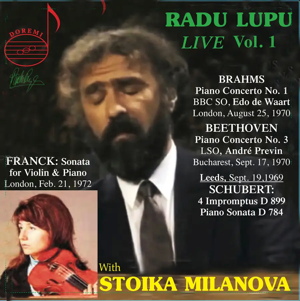
Radu Lupu (piano)
Live Volume 1
Johannes Brahms (1833-1897)
Piano Concerto no.1 in D minor, Op.15
César Franck (1822-1890)
Sonata for Violin and Piano in A major
Ludwig van Beethoven (1770-1827)
Piano Concerto no.3 in C minor, Op.37
Franz Schubert (1797-1828)
Piano Sonata no.14 in A minor, D784
Four Impromptus, D899
Stoika Milanova (violin)
BBC Symphony Orchestra/Edo de Waart (Brahms)
London Symphony Orchestra/André Previn (Beethoven)
rec. 1969-1972
Doremi DHR-8213/4 [2 CDs: 156]
The Romanian pianist Radu Lupu (1945-2022) shot to fame after winning the Leeds Piano Competition in 1969. It wasn’t his first big win either. He clinched the first prize in the Van Cliburn Competition in 1966 and similarly in the George Enescu International a year later. Until 1969 he was a student of Heinrich Neuhaus, who also taught Sviatoslav Richter and Emil Gilels, at the Moscow Conservatoire. With a repertoire that centred upon Mozart, Schubert and Brahms, from 1970 to 1993 he recorded almost exclusively with Decca. His solo recordings were met with great critical acclaim. He retired from the concert platform in 2019. For an artist of his stature he didn’t make that many commercial recordings, so these live inscriptions issued by Doremi (this is Volume 1 in a projected series) are very welcome in bolstering his discography.
CD 1 opens with an epic performance of Brahms Piano Concerto No. 1, recorded in London on 25 August 1970. The orchestra is the BBC Symphony Orchestra under the direction of Edo de Waart. I much prefer this live airing to the studio recording Lupu made in 1974 with the Royal Philharmonic Orchestra, also under Edo de Waart, which I found to be rather tame and lacking in fire. The thunderous timpani make a dramatic impact at the start of the first movement, and de Waart injects the opening tutti with passion and power. Lupu’s technical command is to be admired; there’s exquisite voicing of chords, clarity of textures and a wonderful array of tonal wash. There’s plenty of raw emotion all round. The slow movement reveals some beautiful warm playing from the BBC strings. It’s a penetrating account brimming over with poetic insights. The finale is invigorating and vital, with the soloist responding well to de Waart’s energized conducting.
César Franck’s richly lyrical Violin Sonata derives from a recital given at St. John’s Smith Square, London on 21 February 1972. Here Lupu teams up with Bulgarian (not Romanian as wrongly stated by the BBC announcer) violinist Stoika Milanova, who was born the same year as the pianist. She was a student of David Oistrakh in Moscow. The performance melds together dramatic intensity with rhetorical gesture. The demands on the pianist are challenging, and any performance’s success is dependent on the achievement of a musical union between the two players. In the first movement the ebb and flow of the narrative are confidently negotiated. The second movement is turbulent and impressively virtuosic. The heartfelt anguish of the Recitativo is particularly touching, whilst the finale is dispatched with the sheer joy and elation. Lupu made a studio recording of the Sonata with Kyung-Wha Chung in 1980 which, for me, has always been a benchmark for this work.
The recording of Beethoven’s Piano Concerto no.3 in C minor is the least successful in this collection. The sound quality of this performance, set down in Bucharest on 17 September, 1970, is cramped and boxy, with the piano brittle in tone and limited in dynamic range. The orchestra is recessed and Previn’s conducting is uninspiring and pedestrian. Unfortunately, I can’t say anything positive about this particular item.
For me, Schubert sits at the centre of Lupu’s repertoire. This is music which benefits greatly for the lyricism and poetry he invests in it. The two Schubert items which end CD 2 were taped at the Leeds International Piano Competition on September 19, 1969. The Sonata in A Minor, D 784 opens with a melody in octaves, and the music which unfolds is characterized by a bleak, mournful tread. In the slow movement Lupu takes a dreamy and contemplative view, whilst the finale is fleeting, mysterious and urgent.
The Four Impromptus, D899 are characterized by beguiling melodies and ephemeral moods. The opening C minor piece is given a dramatic and rhetorical approach, and I’m enamoured by the way Lupu contours the expressive singing line in the G-flat Impromptu. All told these are exalted performances from a player of unparalleled refinement.
Apart from the Beethoven Piano Concerto, this set has much to offer. Everything else is well recorded and makes a pleasing addition to the pianist’s discographical legacy. The accompanying booklet notes are brief, as is the norm with Doremi, consisting of one page by Jack Silver. Aficionados of the artistry of the great Romanian will be more than happy with this, and can look forward to the subsequent volumes in the series.
Stephen Greenbank
Buying this recording via a link below generates revenue for MWI, which helps the site remain free.



Recording details
25 August 1970, London (Brahms)
21 February 1972, St. John’s Smith Square, London (Franck)
17 September 1970, Bucharest (Beethoven)
19 September 1969, Leeds (Schubert)

















